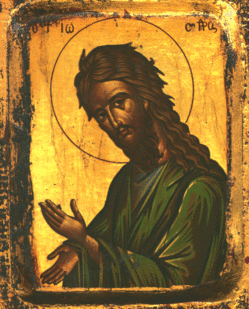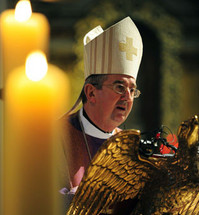The Catholic Church in Ireland is facing what we in the USA continue to face and the Church in parts of the world also face or will face: sin. Archbishop Diarmuid Martin, Archbishop of Dublin, is working overtime to renew himself and the Church he leads to a deeper contrition and to a renewed sense of mission as a disciple of Jesus Christ. Like Saint John the Baptist, Archbishop Martin tells us clearly that self-centeredness and arrogance are not legitimate virtues for Catholics to allow to dwell in the heart and in the way one acts. What the Archbishop says about his Church can be said of us personally, and the Church in the USA. Time to change!!!! As the Baptist says, "I must decrease and He --Jesus-- must increase.

The Gospel of this morning's Mass recalls that great figure: John the Baptist. John's task was to announce the coming of Jesus. He was called to reawaken a sense of expectation among a people that had grown tired and distant from God. He was called to bring renewal to institutional expressions of religion which, at the time, had so often become fossilised into mere formulae or external ritual. John's work was extraordinary. He attracted thousands to come out into the desert to see him. He wrought conversion on a vast scale.
John was a man who stood out. His strange dress - the wild camel hair and the leather girdle - was not chosen as a publicity gimmick or a trademark. His message was one that spoke of rising above conventional ways of thinking, conventional expectations and attitudes. He shunned the external amenities of a comfortable life because he wanted to show his absolute dependence on God. His detachment from life's comforts gave him the freedom to truly recognise the message of Jesus.
The figure of John serves as a warning to us today, to all believers, to the Church and to Church organizations of every age of our need to draw our strength from Christ alone, rather than from identifying with the cultural patterns and fashions of the day, which in any case come and go.
The Church is there to proclaim and live out the message of Jesus. It is not there in any way to be inward looking and self protecting. The Church is called to renewal, to tear itself away from conventional expectations, attitudes and superficialities. The Church in every age must become like John the Baptist, an uncomfortable reminder of how we must repent and allow the truth of Jesus to break into and enlighten the darkness that can at any moment enter into our lives or the life of the Church. The Church's message must be a message of hope. That is the message of the first and second reading: The prophet Isaiah wrote "Do not be afraid, look your God is coming"; and Saint James wrote: "Do not loose heart, because the Lord's coming will be soon".
I came here this morning to renew my apologies to the people of this parish for the facts that this week have emerged one step more clearly about the abuse of children in Ballyfermot by the former priest Tony Walsh and about the way this abuse was hushed-up by people with responsibility in the parish and in the diocese.
I come to bring my apology to a parish to which I owe much. I grew up here. It is a parish to which I belonged and to which I feel I still belong. It is a parish which grew up in hardship, but whose people worked hard and supported each other and above all gave themselves so that their children could do well in life. This has been the story of Ballyfermot for years, as it is today. Ballyfermot is a community which can be proud of its achievements and of its people especially its young people.
How do I explain to a community marked by such honesty, good neighbourliness and hard work that the Church failed many children of this parish? How do I explain to those who were abused? How do I explain to parents and family members, especially to those who had courage to come forward and denounce what was happening? Many of those who came forward did not want to damage the Church they loved; they simply wanted abuse to be stopped effectively and definitively. Their love of the Church was betrayed by leadership in the Church.
I cannot but recall that in the years in which I lived in this parish I was exactly at the age of many of the children who were abused by Tony Walsh and sadly by a number of other priests who worked in this parish over the years.
I apologise unreservedly. As I look back, I see more clearly that the catastrophic manner in which the abuse was dealt with was a symptom of a deeper malaise within the Irish Church. As I have said elsewhere, in many aspects the Church in Ireland had allowed itself to drift into a position where its role in society had grown beyond what is legitimate. It acted as a world apart. It had often become self-centred and arrogant. It felt that it could be forgiving of abusers in a simplistic manner and rarely empathised with the hurt of children.
John the Baptist described his own voice as a voice crying in the wilderness. The story of Tony Walsh shows that for far too long "wilderness" was allowed enter into the life of the Church. The first step on the road to renewal is for the Church to recognise that wilderness, to honestly acknowledge with no "buts" and no conditionality the gravity and the extent of what happened.
Recognising that wilderness means that we then return changed to the world in which we live. Renewal is not about going back to business as before. As a diocese and as a parish we have to sustain and develop our robust child safeguarding procedures. We must renew our efforts at evangelization, making the message of Jesus known and making it the norm for the way we live and interact.
For Jesus, Childhood is a sign of God's kingdom. The message of Christmas, which stresses how God restored hope through revealing himself in the fragility and precariousness of a helpless child, can lead us on the path to renewal. But that renewal will come not just form a superficial, emotional celebration of Christmas, but through becoming like Jesus in our lives and radiating the love and the concern of Jesus wherever we are.

I come here to apologise. I must also however recognise the great work that was done through the Church in this parish: by its religious, its priests, its committed lay men and women. I come to recognise the efforts of parents and teachers. Sadly short-sighted attempts by some to avoid scandal for the Church have inflicted scandal and tarnished the good name of many good people. I apologise and ask forgiveness and light from Christ, the prince of peace.
Today's Gospel reminds all of us - beginning with myself - as we gather two thousand years after John's appearance in the desert, that preparing for the coming of Jesus means that we have to convert, to change our lives. It calls on us to interpret correctly the meaning of Christ's coming for our lives and for the society in which we live.
The Christian message has the ability to fascinate and challenge in every age. Our young people need to hear Christ's message in its clarity and in all its demands. We need to help young people to see that the true foundation of meaning and hope comes in the message of Jesus: "He is the one". May our celebration of Christmas renew us authentically.
Archbishop Diarmuid MartinArchbishop of Dublin
Church of the Assumption, Ballyfermot
Third Sunday of Advent 2010
12 December 2010


Leave a comment